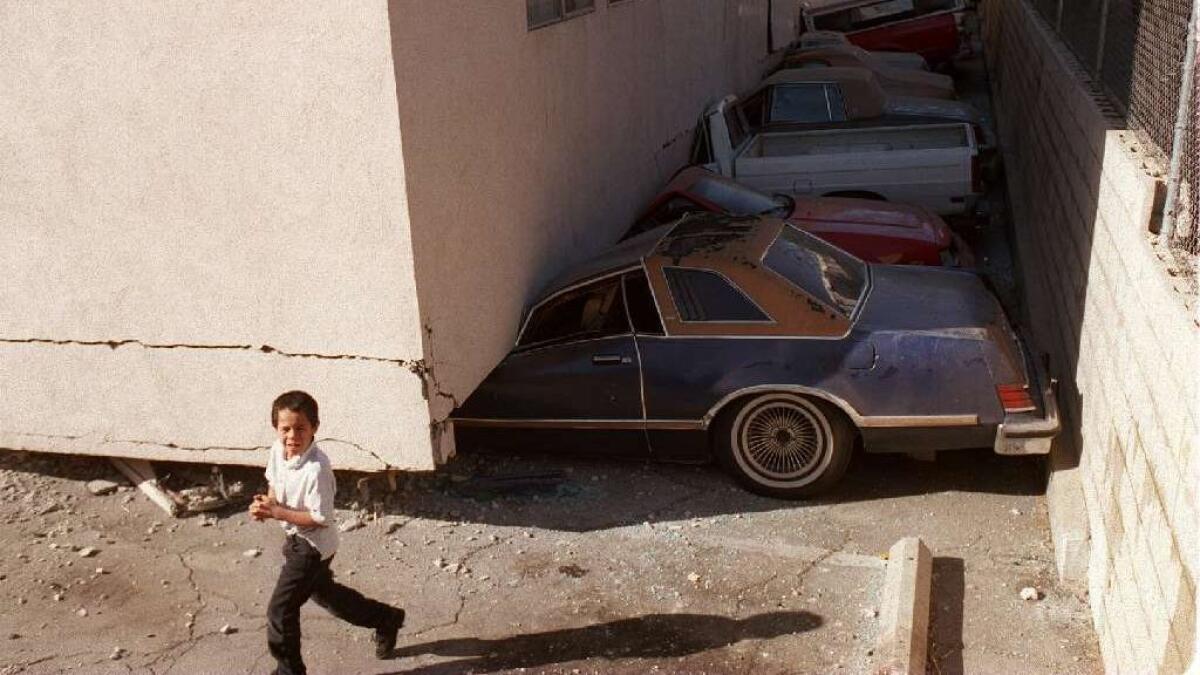Gov. Jerry Brown vetoes bill that would create list of quake-vulnerable buildings

- Share via
Gov. Jerry Brown has vetoed an earthquake safety bill that would have asked cities and counties to create lists of buildings that could be at higher risk of major damage or collapse when shaken.
The bill, AB 2681, could have marked a major advance in efforts over the last decade to identify seismically vulnerable buildings in California. A handful of cities, including Los Angeles, have generated lists of potentially vulnerable buildings that face the greatest risk of collapse. Some have ordered owners to retrofit those buildings to make them more secure.
Backers of the bill said creating a list of possibly vulnerable buildings in the state’s most seismically active areas would represent a major step in alerting Californians to whether the buildings they live and work in should receive more study to determine whether they’re at risk in an earthquake.
But the governor wrote that he was concerned the bill “will not provide the greatest value for the significant investment this enterprise requires.”
It was unclear what creating an inventory would have cost; rough estimates published by legislative staffers say it it could be in the tens of millions of dollars. Advocates suggested a far lower cost, perhaps $15 million to $20 million. The bill would have required the inventory to be submitted to the Governor’s Office of Emergency Services by Jan. 1, 2021.
“A more suitable approach,” Brown wrote, “is to develop a partnership between the state, local governments and building owners to develop a plan to cost effectively identify collapse-prone buildings and a realistic timeline to develop an inventory.” The governor said he would ask the state Seismic Safety Commission and other seismic experts to recommend “an achievable path toward improving the safety of earthquake-vulnerable buildings.”
The bill’s author, Assemblyman Adrin Nazarian (D-North Hollywood), said he was disappointed by the veto.
“California is not prepared for the staggering cost in lives and property damage when the ‘Big One’ hits. I look forward to working with the California Seismic Safety Commission to identify and improve building safety across California,” Nazarian said in a statement.
Even if the bill had become law, there was a big limitation — it did not provide funding. The law would have taken effect only if state officials found a future source of funding for the project.
The measure was opposed by some groups representing local governments. The League of California Cities as well as California Building Officials — an association of local building officials — said the mandate to create such a list would have been burdensome to small building departments.
“If local government is to be the conduit to recognizing where these vulnerable buildings are, we have to figure out how to pay for that,” Matthew Wheeler, executive director of California Building Officials, said earlier this month.
Supporters of the bill included Los Angeles Mayor Eric Garcetti, the West Hollywood City Council, the San Gabriel Valley Council of Governments, the Structural Engineers Assn. of California and the U.S. Resiliency Council.
“If you don’t know how sick you are, or how vulnerable you are, to me, it’s a sign of ignorance,” David Khorram, Long Beach’s superintendent of building and safety, said earlier this month. “A mandate like this will help and encourage smaller cities to accomplish what the bigger cities are doing.”
A separate bill on earthquake safety, AB 1857, which passed the Senate 38 to 0 and the Assembly 77 to 0, is still being considered by the governor.
The bill would create a committee to consider whether a tougher building standard should be adopted that would result in more new buildings that could be repaired and reoccupied after a major earthquake instead of having to be torn down.
The panel would also be asked to determine whether that tougher building standard should be made mandatory or voluntary.
More to Read
Sign up for Essential California
The most important California stories and recommendations in your inbox every morning.
You may occasionally receive promotional content from the Los Angeles Times.











